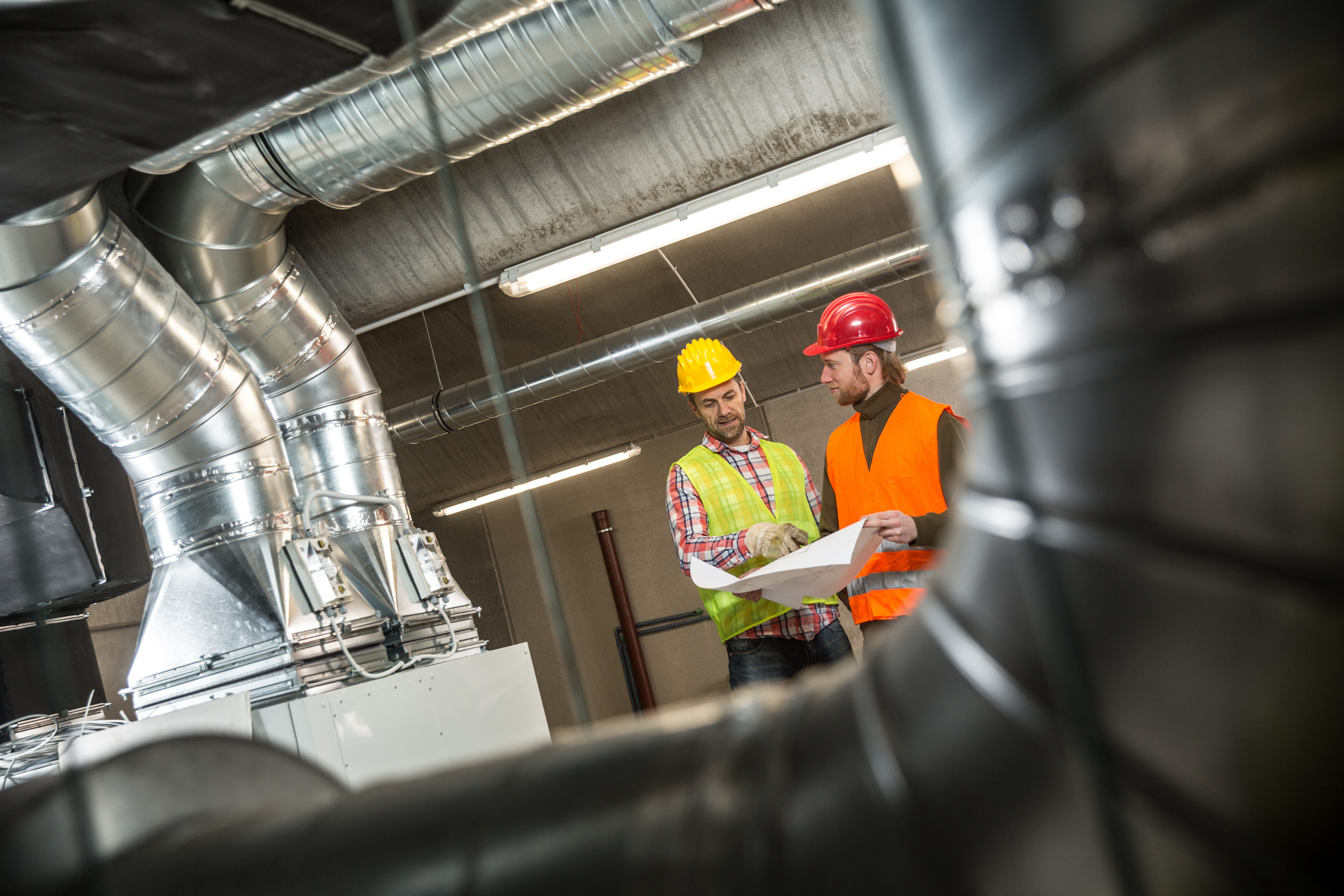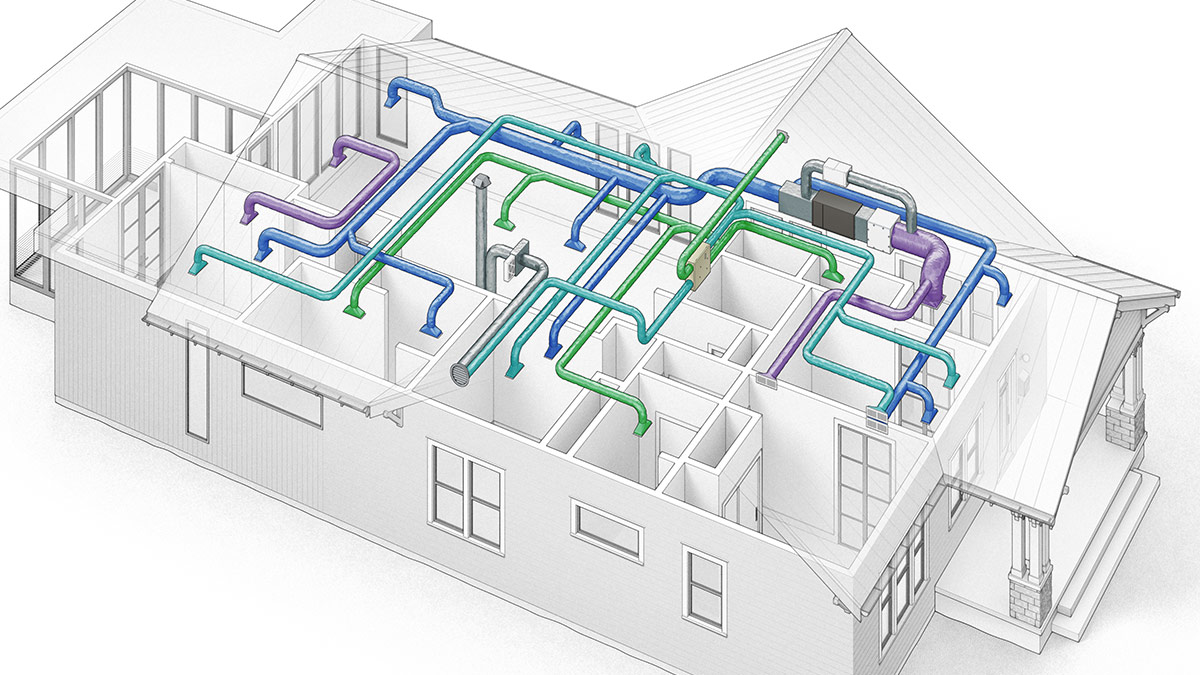Discover why HVAC experts are the preferred professionals for HVAC services
Exploring the Important Components of a Reliable Heating And Cooling System
An efficient heating and cooling system is improved a number of critical parts that operate in consistency. Each component, from the thermostat to the ductwork, plays an important duty in keeping convenience and power performance. Recognizing these components is critical for maximizing efficiency and boosting interior air high quality. As one takes a look at these elements, the elaborate connections between them expose insights into enhancing total system efficiency. What certain variables contribute most to this effectiveness?
The Function of the Thermostat in A/c Performance
Usually ignored, the thermostat plays a crucial duty in the performance of HVAC systems. This small tool acts as the primary control center, managing temperature setups and guaranteeing ideal convenience within a space. By accurately picking up the ambient temperature, the thermostat communicates with the home heating, air, and air flow conditioning devices to maintain the wanted environment
A reliable thermostat reduces power consumption by turning on the heating and cooling system just when needed, thereby preventing excessive home heating or air conditioning. Modern programmable and clever thermostats improve this performance additionally by enabling customers to establish routines and remotely adjust settings, adjusting to everyday regimens.
The positioning of the thermostat is important; inappropriate location can lead to imprecise temperature readings, resulting in inefficient procedure. Generally, a well-functioning thermostat not only enhances convenience but likewise adds noticeably to power savings and the longevity of the cooling and heating system.
Comprehending the Importance of Air Filters
Air filters offer an important function in a/c systems by guaranteeing that the air circulating within a room continues to be healthy and balanced and clean. These filters catch dirt, irritants, and other pollutants, avoiding them from being recirculated throughout the environment. By capturing these fragments, air filters add to enhanced indoor air high quality, which can significantly benefit passengers' health and wellness, particularly those with allergic reactions or breathing problems.
Furthermore, maintaining clean air filters boosts the performance of HVAC systems. Blocked filters can restrict airflow, creating the system to work harder to preserve preferred temperature levels, causing increased power consumption and greater energy costs. Consistently changing or cleansing filters is a vital maintenance step that can lengthen the lifespan of a/c devices. Inevitably, understanding the value of air filters allows property owners and building managers to take positive actions to guarantee a well-functioning, efficient cooling and heating system that advertises a comfy and safe interior environment.

The Performance of the Heater and Warmth Pump
Furnaces and heatpump are crucial parts of cooling and heating systems, responsible for giving heat throughout colder months. Furnaces operate by heating air through combustion or electrical resistance, then distributing it throughout the home by means of air ducts. They normally provide rapid home heating and can be fueled by gas, electrical energy, or oil, relying on the system kind.
Conversely, warmth pumps move warmth instead of create it. They extract warm from the outside air or ground, also in low temperature levels, and transfer it inside. HVAC experts. This double performance enables heatpump to also provide air conditioning in warmer months, making them versatile alternatives for year-round climate control
Both systems need appropriate maintenance to ensure efficiency and durability. While furnaces master severe cool, heat pumps can be useful in modest environments. Understanding their distinct functionalities aids homeowners in selecting one of the most ideal option for their heating needs.
Checking Out the A/c Unit
The air conditioning device is a vital element of cooling and heating systems, readily available in numerous kinds to match various requirements. Understanding the efficiency rankings of these devices is important for making informed options regarding energy usage and price. This section will certainly check out the diverse kinds of a/c unit and clear up just how efficiency rankings effect performance.
Kinds Of Air Conditioners
While different variables influence the option of air conditioning systems, understanding the different kinds available is crucial for property owners and building supervisors alike. Central air conditioners are developed to cool down entire homes or structures, utilizing a network of ducts for air flow. Window devices provide an even more localized option, ideal for small rooms or single areas. Portable a/c unit provide versatility, permitting customers to move the system Full Article as needed. Ductless mini-split systems are an additional alternative, integrating the efficiency of central systems with the benefit of zoning, as they need no ductwork. Geothermal systems harness the planet's temperature for energy-efficient cooling. Each type comes with distinctive advantages, making informed choices essential for reliable environment control.

Efficiency Scores Described
Understanding performance rankings is necessary for choosing the best cooling unit, as these metrics offer insight into the system's performance and energy intake. The most typical ranking for a/c is the Seasonal Energy Effectiveness Proportion (SEER), which measures the cooling outcome during a typical air conditioning period divided by the overall electric energy input. A greater SEER shows better effectiveness. Additionally, the Energy Effectiveness Proportion (EER) is utilized for measuring performance under specific problems. One more vital metric is the Power Celebrity accreditation, which represents that a device fulfills stringent power efficiency standards. By reviewing these rankings, consumers can make enlightened selections that not just enhance convenience but additionally decrease power prices and environmental influence.
The Relevance of Ductwork and Air movement
Reliable ductwork layout and airflow management play critical functions in the total effectiveness and efficiency of cooling and heating systems. Correct ductwork assurances that conditioned air is distributed evenly throughout a room, minimizing temperature changes and improving comfort. Properly designed air ducts lessen resistance to airflow, minimizing the workload on cooling and heating devices and eventually lowering power intake.
Air flow monitoring involves purposefully putting vents and signs up to enhance the flow of air. This stops common concerns such as cold or hot areas, which can happen when air movement is blocked or improperly balanced. Furthermore, the best duct products and insulation can even more boost performance by reducing warmth loss or gain during air transportation.
An effective ductwork system not just contributes to power cost savings yet can additionally extend the lifespan of HVAC equipment by minimizing unnecessary strain (HVAC experts). Recognizing the value of ductwork and air flow is important for accomplishing peak HVAC system efficiency.
Routine Upkeep Practices to Enhance Performance
Routine maintenance practices are essential for guaranteeing peak efficiency of a/c systems. These techniques include regular inspections, cleaning, and needed repair services to maintain the system running efficiently. Regularly changing air filters is important, as clogged filters can obstruct air flow and lower performance. In addition, specialists should check and clean evaporator and condenser coils to avoid overheating and look at these guys energy wastefulness.
Yearly specialist examinations are additionally recommended, as trained professionals can identify possible problems before they rise. Lubing relocating components minimizes damage, adding to a much longer life expectancy for the system. Making sure that the thermostat works properly help in maintaining ideal temperature control.
Regularly Asked Concerns
Just how Commonly Should I Change My Thermostat?
Thermostats should normally be replaced every 5 to 10 years, depending upon use and modern technology useful link innovations. Routine checks are recommended to assure peak performance, specifically if experiencing irregular temperature control or enhanced power prices.
What Dimension Air Filter Is Best for My Heating And Cooling System?
The most effective size air filter for a heating and cooling system varies by system style. Usually, it's vital to get in touch with the proprietor's handbook or check the existing filter dimensions to ensure peak efficiency and air high quality.
Can I Install a Heatpump Myself?
Setting up a heatpump separately is possible for proficient individuals, however it needs understanding of regional codes and electric systems. Hiring an expert is recommended to guarantee appropriate installment and optimal system performance.
Exactly how Do I Know if My Ductwork Is Efficient?
To figure out ductwork effectiveness, one must check for leakages, step air flow at vents, check insulation quality, and assess temperature distinctions between supply and return air ducts. Specialist evaluations can offer comprehensive understandings right into general performance.
What Are Indications My Heating And Cooling Demands Immediate Upkeep?
Indicators that an a/c system needs immediate maintenance include uncommon noises, inconsistent temperatures, raised power expenses, undesirable smells, and regular cycling. Attending to these concerns promptly can avoid additional damages and assurance peak system performance.
Air filters offer a necessary feature in A/c systems by assuring that the air flowing within a space continues to be healthy and tidy. In addition, keeping clean air filters boosts the effectiveness of Cooling and heating systems. Ductless mini-split systems are another alternative, combining the effectiveness of central systems with the benefit of zoning, as they need no ductwork. Understanding effectiveness rankings is crucial for selecting the ideal air conditioning unit, as these metrics provide understanding into the system's performance and power usage. The finest size air filter for a Cooling and heating system differs by device layout.